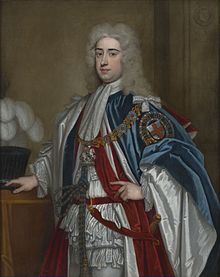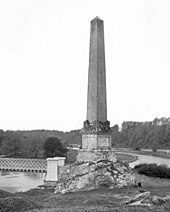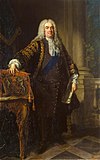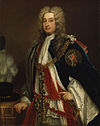Lionel Sackville, 1st Duke of Dorset
 From Wikipedia - Reading time: 8 min
From Wikipedia - Reading time: 8 min
The Duke of Dorset | |
|---|---|
 1719 portrait by Godfrey Kneller | |
| Lord Lieutenant of Ireland | |
| In office 23 June 1730 – 9 April 1737 | |
| Monarch | George II |
| Preceded by | Earl Granville |
| Succeeded by | Duke of Devonshire |
| Lord President of the Council | |
| In office 3 January 1745 – 17 June 1751 | |
| Monarch | George II |
| Preceded by | Earl of Harrington |
| Succeeded by | Earl Granville |
| Lord Lieutenant of Ireland | |
| In office 15 December 1750 – 2 April 1755 | |
| Monarch | George II |
| Preceded by | Earl of Harrington |
| Succeeded by | Marquess of Hartington |
| Personal details | |
| Born | 18 January 1688 Dorset, England |
| Died | 10 October 1765 (aged 77) Knole, Kent |
| Spouse | |
| Children | |
| Parents | |
Lionel Cranfield Sackville, 1st Duke of Dorset KG PC (18 January 1688 – 10 October 1765) was an English peer and politician who served as Lord President of the Council from 1745 to 1751. He also twice served as Lord Lieutenant of Ireland from 1730 to 1737 and again from 1750 to 1755.
Life
[edit]He was the son of the 6th Earl of Dorset and 1st Earl of Middlesex, and the former Lady Mary Compton, younger daughter of the 3rd Earl of Northampton. Styled Lord Buckhurst from birth, he succeeded his father as 7th Earl of Dorset and 2nd Earl of Middlesex in 1706, and was created Duke of Dorset in 1720.
Perhaps because he had been on a previous diplomatic mission to Hanover, he was chosen to inform George I of his accession to the Crown in August 1714. George I initially favoured him and numerous offices and honours were given to him: Privy Councillor, Knight of the Garter, Groom of the Stole, Lord Steward, Governor of Dover Castle and Warden of the Cinque Ports. At George I's coronation he carried the sceptre: at the coronation of George II he was Lord High Steward and carried St Edward's Crown. He quarrelled with the King in 1717 and was told his services were no longer required, but was made a duke three years later.
Lord Lieutenant of Ireland
[edit]
Dorset served twice as Lord Lieutenant of Ireland, from 1731 to 1737 and again from 1751 to 1755. In 1739, at the foundation of the Foundling Hospital, he was one of that charity's original governors. His first term as Lord Lieutenant was uneventful. His second took place at a time of acute political tension between the two main factions in the Irish Government, one led by Henry Boyle, the Speaker of the Irish House of Commons, the other by George Stone, the Anglican Archbishop of Armagh. Dorset, now heavily influenced by his son George Sackville, made the mistake of openly backing the Archbishop. He was unable to oust Boyle from power, and was accused of being the Archbishop's tool. He became extremely unpopular, leading to his eventual recall.
The current O'Connell Street in Dublin was named in his honour Sackville Street until 1924.
Last years
[edit]His last years were uneventful, apart from a riot in 1757 caused by the passage of the Militia Act to raise an army for the Seven Years' War, in which he narrowly escaped injury. He died at Knole on 9 October 1765 and was buried at Withyham in Sussex.
Character
[edit]Horace Walpole gave this sketch of his character: "with the greatest dignity in his appearance, he was in private the greatest lover of buffoonery and low company.... he was never thought to have wanted a tendency to power, in whatever hands it was, or was likely to be". Jonathan Swift thought him one of the most agreeable and well-informed men, and best conversationalists, he had ever met. Even harsh critics admitted his dignity and perfect decorum, a last legacy of the manners of the Court of Queen Anne.
Family
[edit]He married Elizabeth Colyear, the daughter of Lieutenant-General Walter Colyear (brother of the David Colyear, 1st Earl of Portmore), in January 1709. She later became a Lady of the Bedchamber (1714–1737) and Mistress of the Robes (1723–1731) to Caroline of Ansbach, wife of George II.
Lionel and Elizabeth's sons were:
- Charles, Earl of Middlesex (later 2nd Duke of Dorset)
- Lord John Sackville (father of John Sackville, 3rd Duke of Dorset)
- Lord George Sackville (later Lord George Germain and 1st Viscount Sackville)
They also had two daughters:
- Elizabeth, who married Thomas Thynne, 2nd Viscount Weymouth
- Caroline, who married Joseph Damer, 1st Earl of Dorchester.
References
[edit]- . Dictionary of National Biography. London: Smith, Elder & Co. 1885–1900.
External links
[edit] Media related to Lionel Sackville, 1st Duke of Dorset at Wikimedia Commons
Media related to Lionel Sackville, 1st Duke of Dorset at Wikimedia Commons
 KSF
KSF
